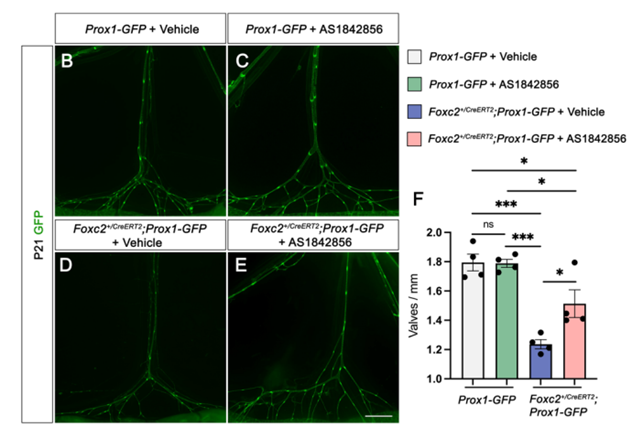Advantages:
- Foxo1 inhibitor increased the expression levels of valve-forming genes in vitro and valves in vivo
- MOA: Foxo1 inhibition increases β-catenin and activates downstream genes
- FOXO1 inhibition can be a viable strategy to rescue valve defects in congenital lymphedema
Summary:
Mutations in many genes that regulate lymphatic valve development are associated with congenital lymphedema. The expression of valve-forming genes in lymphatic endothelial cells (LECs) are upregulated by oscillatory shear stress (OSS). The transcription factor FOXO1 represses lymphatic valve formation by inhibiting the expression of these genes, which makes Foxo1 a potential target for treating lymphedema.
Our researchers tested the ability of the Foxo1 inhibitor AS1842856 to induce the formation of new lymphatic valves. Treatment of cultured lymphatic endothelial cells (LEC) significantly increased the expression levels of valve-forming genes. Administration of AS1842856 to Foxc2 22 +/- mice, a mouse model for lymphedema-distichiasis, increased valve number compared to vehicle treatment. Interestingly, Foxo1 inhibitor treatment increased the level of activated β-catenin, which is known to upregulate the expression of Foxc2 and Prox1 during lymphatic valve formation. Using a mouse model with constitutive activated b-catenin was ale to rescue the loss of lymphatic valves in Foxc2+/- mice. These findings established FOXO1 as a clinically relevant target to stimulate de novo lymphatic valve formation and rescue defective valves in congenital lymphedema.

AS1842856 treatment in vivo increases valve number in Foxc2 624 +/CreERT2 mice.
Desired Partnerships:
- License
- Sponsored Research
- Co-Development